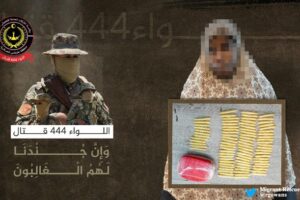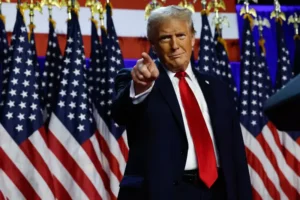Mali’s interim vice president Colonel Assimi Goita said on Tuesday he had seized power as a fresh coup within an older coup unravelled in the country.
Goita was one of the coup plotters that toppled the elected government of Ibrahim Boubacar Keita last August.
He said he took over power because President Bah Ndaw and Prime Minister Moctar Ouane failed to consult him about a cabinet reshuffle, which dropped two former coup leaders.
Both leaders have been detained at a military base outside the capital Bamako since Monday evening.
The two men were in charge of a transitional government created after a military takeover in August that ousted President Ibrahim Boubacar Keita. They were tasked with overseeing a return to democratic elections next year.
In a statement read by an aide on national television, Goita said elections next year to restore an elected government would go ahead as planned.
“The vice president of the transition saw himself obligated to act to preserve the transitional charter and defend the republic,” the statement said.
International pressure increased on Goita and the junta on Tuesday, demanding the release of Ndaw and Ouane.
French President Emmanuel Macron condemned what he said was a “coup within a coup” and raised the threat of targeted sanctions.
The U.N. Security Council is due to privately discuss the latest developments in Mali on Wednesday, diplomats said.
France, a former colonial power and military ally to Mali, joined the United States, the European Union and others in condemning the detention and called for their immediate release.
“We are prepared to take in the coming hours targeted sanctions against those taking part,” Macron told reporters at the end of an EU summit.
Worried about the fallout from Monday’s detentions, the United Nations, European Union, United States and regional countries have all demanded the release of the leaders.
“Sanctions will be adopted against those who stand in the way of the transition,” Josep Borrell, the EU’s foreign affairs chief, said on Twitter.
A delegation from the Economic Community of West African States (ECOWAS) arrived in Mali on Monday to help resolve the dispute.
ECOWAS played a key role in the formation of the interim government after the August coup.
The situation could exacerbate instability in the West African country, where Islamist groups linked to al Qaeda and Islamic State control large areas of the north and centre and stage frequent attacks on the army and civilians.
Political instability and military infighting have complicated efforts by Western powers and neighbouring countries to help Mali, and jihadists have been able to use the country as a launchpad for attacks across the region.
Mali has been in turmoil since 2012 when the army, frustrated over the government’s handling of a rebellion, ousted president Amadou Toumani Toure. Separatist and Islamist rebels took advantage and seized the north of the country.
French forces drove back the Islamists in 2013 but they have regrouped and expanded their reach to neighbouring Burkina Faso and Niger.
The problems in Mali are part of a recent democratic backslide in West and Central Africa, where strong military factions have taken control or presidents have extended their rule beyond their allotted mandates.
Last month a military council seized power in Chad after the battlefield death of president Idriss Deby.
His son, Mahamat Idriss Deby, now runs the country and has promised a transition to civilian rule similar to Mali’s.
The opposition and civil society say the military holds too much power and fear Deby will not relinquish control.
Assimi Goita’s coup statement:
Commander Baba Cissé, special advisor to the vice-president of the Transition, Assimi Goïta, read a statement on Tuesday, May 25, on national television.
“Following a crisis lasting several months at the national level taking into account strikes and various demonstrations by social and political actors, the government led by Mr. Moctar Ouane, has shown itself incapable of constituting a reliable interlocutor, likely to mobilize the confidence of social partners.
In the process and unilaterally, the president of the transition accepted the resignation of the government and immediately renews the prime minister with the mandate to go to the formation of a new government. The consequence has been a general consternation marked by the persistence of strikes by the National Union of Workers of Mali (UNTM), the outcome of which is ultimately an indefinite strike. This state of affairs constitutes a real asphyxiation of the Malian economy and hence the guarantee of instability with immeasurable consequences.
In the process of constituting a new government, the newly appointed Prime Minister established a list of government in agreement with the President of the Transition without consultation with the vice-president in charge of the prerogatives conferred on him by the charter, namely, the Defense and Security. Such an approach testifies to a clear will of the President of the Transition and of the Prime Minister to move towards a violation of the Transition Charter, contrary to the oath taken during his inauguration on September 25, 2020. Notwithstanding the various arrests and negotiations undertaken by the Vice-President to the Heads of State of the sub-region and to certain chancelleries present in Mali in order to bring the President of the Transition and the Prime Minister to respect the requirements of the Transition Charter,
Thus, by the oath taken at the same time as the president of the transition and held by the patriotic commitment taken before the Malian people as well as before the defense and security forces, the vice-president of the transition seen in the obligation to act to preserve the transitional charter and defend the republic prerogatives the President and his Prime Minister as well as all the people implied in the situation.
In this circumstance, the vice-president of the Transition invites the populations to go about their business freely and reassures them of the unwavering commitment of the Armed Forces of Defense and Security, to preserve the best interests of the Malian people, in accordance with the spirit and letter of the Transition Charter. Moreover, the vice-president of the Transition would like to point out that the Transition process is following its normal course and that the elections scheduled will be held during 2022 ”.











Add Comment